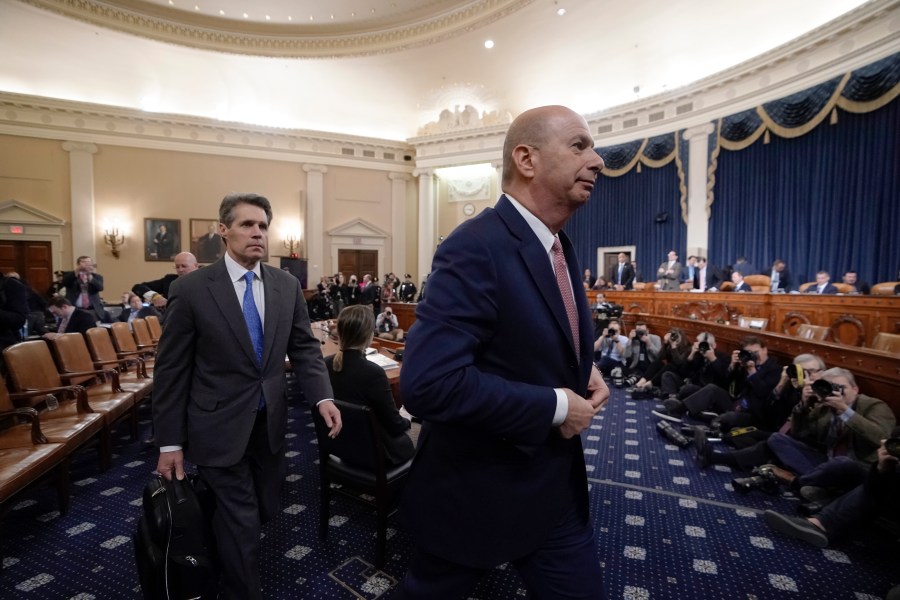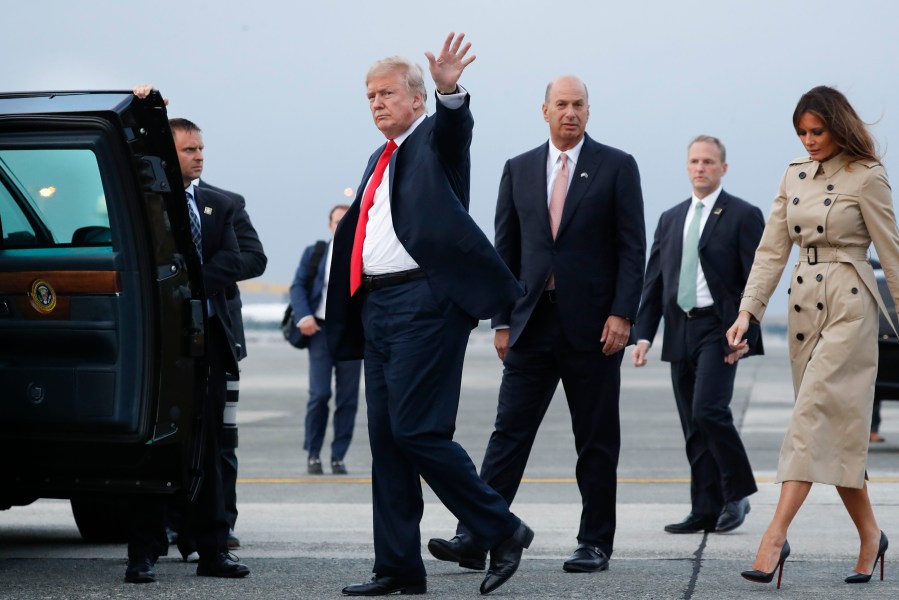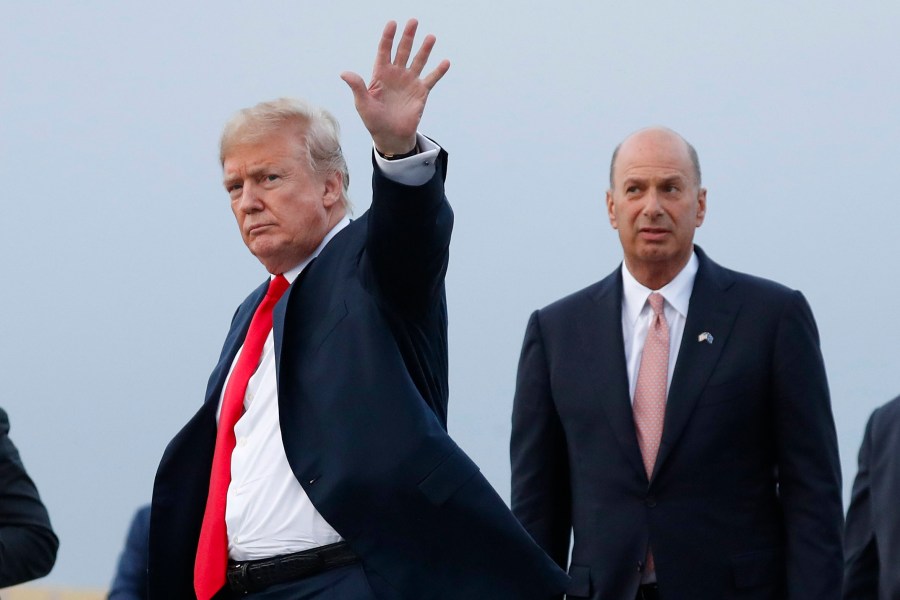How Gordon Sondland went from hotelier to ambassador to central impeachment figure
Former Ambassador Gordon Sondland was standing with former President Trump in August 2019, waiting for the president of Romania to arrive for a meeting, when Trump pulled out a container of Tic Tacs and ate a few.
“What the f—, aren’t you going to share?” Sondland recalls asking him, prompting Trump to give Sondland a few of the mints.
“When you call him out on not acting like a normal person, it catches him off guard—and then he kind of likes it. People do it too infrequently,” Sondland writes in his upcoming book, “The Envoy: Mastering the Art of Diplomacy with Trump and the World,” which The Hill obtained a copy of before its release next week.
Sondland, who spent roughly two years serving as Trump’s ambassador to the European Union, is best known for his testimony in the House’s first impeachment of Trump in 2019 over allegations the former president withheld aid to Ukraine as he pushed for an investigation into Joe Biden and his son Hunter Biden.
His book separately offers an assessment of how he was able to successfully work with Trump, a man with no previous political experience, despite having no prior experience in the foreign service.

U.S. Ambassador to the European Union Gordon Sondland, finishes a day of testimony before the House Intelligence Committee on Capitol Hill in Washington, pictured here in 2019.
“I certainly think Trump treated me differently because I was also a successful hotelier, but it’s not just my place in business that won his respect,” Sondland writes.
“It’s an attitude that you have to have with him in order to survive. None of the politicians in office, from Ted Cruz to Josh Hawley to [Marjorie] Taylor Greene to Tom Cotton, know how to adopt this approach,” Sondland continues. “They’re sycophants who built careers on dissembling and playing roles that aren’t authentic. That’s not the way to get things done when it comes to a guy like Trump.”
Sondland’s new book focuses on how he went from being a hotelier, to a $1 million donor to the Trump inauguration, to ambassador to the European Union, to central figure in an impeachment investigation, to being fired by the former president for his testimony.
In the book, Sondland discusses how he believes his lack of government experience made him an effective diplomat and better able to communicate with Trump, a fellow businessman.

President Donald Trump pictured with the then U.S. ambassador to the European Union, Gordon Sondland, with first lady Melania Trump in Brussels, Belgium.
Sondland describes another episode in which Trump bemoans to German business leaders that the seats in German automobiles come with too many knobs and buttons. When Trump asks Sondland how the meeting went, Sondland responds, “It went great until you started in on the seats.”
“He looks at me and grimaces. ‘What the f— do you know, Sondland? Get out of here,’” Sondland writes. “I turn and leave the Oval Office, smiling.”
In an interview, Sondland said a major theme of the book focuses on how political appointees can actually be more effective than career foreign service officials who steadily rise through the ranks to become an ambassador.
Sondland argued that, if properly vetted, political appointees like himself can do what others can’t by aggressively moving a president’s agenda forward when time is a major constraint for all administrations. He also noted that political appointees aren’t dependent on the government job for their careers, and therefore are more willing to take risks.
“Here’s my take: many who disdain political appointees say that a career-groomed Georgetown foreign service graduate is more qualified to hold the position of chief of mission than the head of a hedge fund who knows relatively little about foreign policy but knows how to manage people and make and close deals,” Sondland writes in the book. “The former has subject matter expertise, but the latter understands business, knows how to negotiate, knows how to get things done, and has access to the commander-in-chief. Who do you want running the embassy?”
Sondland writes that he felt a sense of kinship with Trump, who also ran hotels as part of his business empire, and that the two were able to communicate more easily that way.

Former President Donald Trump is joined by Gordon Sondland, the U.S. ambassador to the European Union, in Brussels, Belgium.
Sondland, in his book and in an interview, spoke highly of Trump’s accomplishments on the economy, on shifting international focus to China and on recalibrating the trade deals between the U.S. and the EU.
Sondland’s experience has only become more relevant with war breaking out in Europe after Russia invaded Ukraine in February. The former ambassador said the Biden administration has done a “laudable job” in providing support to Ukraine. But he suggested Trump’s skill set and willingness to bluntly confront other leaders might have prevented the invasion in the first place.
Trump, Sondland argued, has “permanently changed” the way foreign policy is conducted by exposing the reality that many relationships are transactional and that it’s better to acknowledge that up front. Trump also normalized informal calls directly between leaders, Sondland said, something he expects to continue in place of calls that are prefaced by months of prep work.
Ultimately, though, Sondland will likely be remembered by much of the nation as the figure in the first Trump impeachment inquiry who acknowledged there was a “quid pro quo” at play when Trump held up aid to Ukraine while pushing for an investigation into the Biden family.
Roughly three years after his testimony, Sondland writes that he merely sought to tell the truth in a highly polarized environment where Democrats wanted him to implicate Trump and Republicans wanted him to exonerate the president.
He expresses frustration over the toll the ordeal took on him and his family, but ultimately downplays the significance of the phrase at the center of his testimony and the whole first impeachment saga.
“Yes, I’m the quid pro quo guy, but you know what? Everything in life is some kind of a quid pro quo,” Sondland writes. “The fact is that when you give someone something—time, affection, devotion, money, loyalty—you expect something in return. It’s how diplomacy works. It’s how life works.”
Copyright 2023 Nexstar Media Inc. All rights reserved. This material may not be published, broadcast, rewritten, or redistributed. Regular the hill posts







